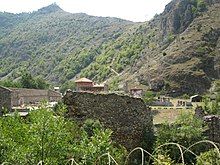| Description |
: |
The Monastery of the Holy Archangels (Serbian: Манастир Светих Архангела, romanized: Manastir Svetih Arhangela; Albanian: Manastiri i Arkangjelit të Shenjtë) is a Serbian Orthodox monastery located in Prizren, Kosovo.[a] The monastery was founded by the Serbian Emperor Stefan Dušan (reigned 1331–1355) between 1343 and 1352 on the site of an earlier church, part of the Višegrad fortress complex. It was the burial church for Emperor Dušan, and represented the culmination of the Serbian ecclesiastical architectural style, that led to the birth of the Morava school style.
The complex, which ranges over 6,500 m², includes two churches, the main one is dedicated...
Read More
|
The Monastery of the Holy Archangels (Serbian: Манастир Светих Архангела, romanized: Manastir Svetih Arhangela; Albanian: Manastiri i Arkangjelit të Shenjtë) is a Serbian Orthodox monastery located in Prizren, Kosovo.[a] The monastery was founded by the Serbian Emperor Stefan Dušan (reigned 1331–1355) between 1343 and 1352 on the site of an earlier church, part of the Višegrad fortress complex. It was the burial church for Emperor Dušan, and represented the culmination of the Serbian ecclesiastical architectural style, that led to the birth of the Morava school style.
The complex, which ranges over 6,500 m², includes two churches, the main one is dedicated to the Holy Archangels (where Dušan's tomb lied), and the second one is dedicated to St. Nicholas, both built in the Rascian architectural style. The monastery was looted and destroyed after the Ottomans arrived in 1455, and in 1615 it was razed to the ground and its material was used for the construction of the Sinan Pasha Mosque, Prizren.
The entire complex was archeologically explored in 1927, and its remains were conserved after the Second World War. During the last decade of the 20th century, work on the reconstruction was continued, and in 1998 it again became an active male monastery. After the 1999 NATO bombing of Yugoslavia and retreat of the Yugoslav army forces, reconstructed objects were burned and looted in June 1999, by members of the Kosovo Liberation Army (KLA), after the Kosovo Force (KFOR) arrived. During the 2004 unrest in Kosovo, the monastery was burned and looted again. The entire monastery complex is under protection of the Republic of Serbia, as a Monument of Culture of Great Importance. One priest lives in the monastery which is under constant protection of Kosovo police in a special protection zone. |

